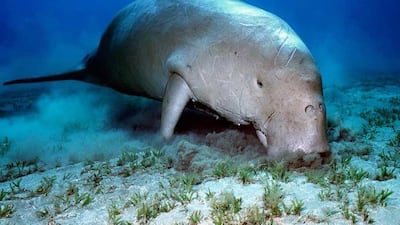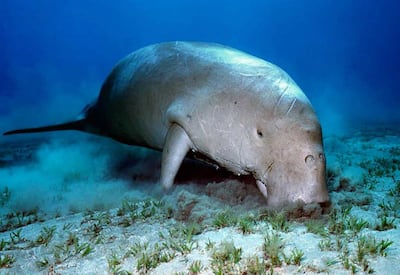A large herd of dugongs has been filmed swimming near Abu Dhabi’s Bu Tinah island.
About 40 dugongs can be seen at the surface of the water in the new video from the Environment Agency Abu Dhabi, with a further 100 believed to swimming underneath.
The team recorded the gentle sea creatures near Khour al Bazem in the Marawah marine reserve, the world’s first Unesco-designated marine biosphere reserve, while they were on their way to Bu Tinah to tag green turtles.
“It’s not unusual to see a large herd of dugongs in Abu Dhabi waters,” said Ibrahim Bugla, head of the marine assessment and monitoring sector for EAD.
“But big groups like that are more common in the winter than in the summer. There haven’t been enough studies done until now as to why that is but it could be related to food, shelter from bad weather or reproduction.”
The waters around Bu Tinah, a tiny cluster of islands, are important foraging grounds for both turtles and dugongs.
The archipelago, one of the most important sanctuaries for turtles in the Indian Ocean, is under the protection of the UN Environment Programme’s Indian Ocean – South-East Asian Turtle pact.
“We managed to attach seven satellite tags to green turtles over three days during the trip,” said Mr Bugla.
“It is not unusual, we always find green turtles.”
Abu Dhabi is home to the world’s second largest population of dugongs after Australia.
The mammals, affectionately known as sea cows due to them feeding on sea-grass, have been protected under UAE law since 1999.
More than 1,000 dugongs are also believed to live in the waters around the archipelago.
In 2011, Bu Tinah narrowly missed out being named one of the New Seven Wonders of Nature, after appearing on a shortlist of 28 locations.
It is home to around 16 species of coral, which thrive in conditions that would normally destroy them. Corals typically live in water that is between 23°C and 28°C, but in the UAE water temperatures reach as high as 37°C in summer.



